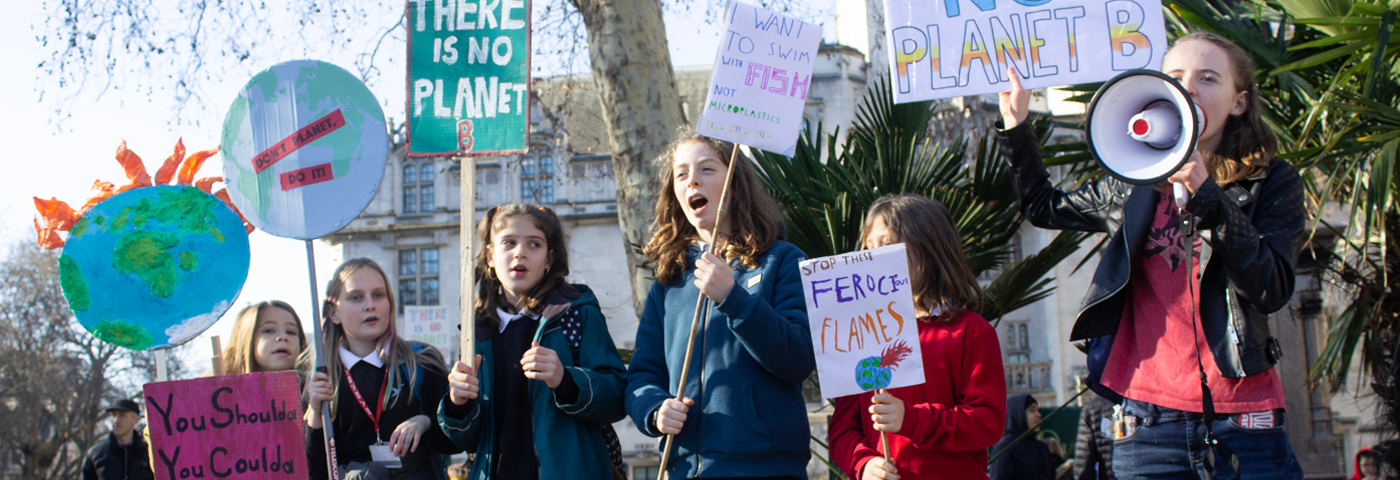A wave of climate protest is sweeping the planet, and those of us working in tourism would do well to reflect quickly on how it will impact our industry, and what we should do.
This Friday, children across the world will skip school to protest at us adults’ inability to ensure them a livable future. We don’t know how many will take to the streets for sure, but in total it could be in the 100,000s. The website FridaysForFuture lists the number of countries where actions have so far been announced. When I filed this blog on Tuesday morning, it was 1209 actions, in 92 countries.
Whatever the total turns out to be, the scale that this movement continues to grow at is phenomenal. It only began last August, when one 15-year old girl, Greta Thunberg, sat by herself on the footsteps of the Swedish Parliament. She has continued to do this every Friday since, with more and more children – and adults – joining her both there and elsewhere around the world.

So what should those of us working in tourism do this Friday, and afterwards?
Firstly, and most importantly, if we have children who want to protest – support them. We are an industry based on the idea that there is deeper value to be had in taking time off from work and studies to go outside. There has never been a better day to get our priorities straight.
Last month several prominent scientists and academics – including the climatologist Kevin Anderson, who was keynote speaker at World Responsible Tourism Day in 2015, and Sir Tim Smit, Co-Founder of the Eden Project, signed an open letter “in solidarity with the children going on school climate strike”. As Professor Anderson wrote on Twitter a few days ago: “In just a few months a new global constituency has emerged, whose voices are loud and demands cogent. It’s up to the rest of us to listen to, engage with and then act for & with them. We owe them thanks for saying what most of us know, but have been too afraid to acknowledge.” The UK’s Times newspaper – not exactly a radical pamphlet – also ran an editorial in support. It stated: “They will live in an era of heightened risk of irreversible planetary damage. They are right not to take it meekly, or to reserve their dismay to evenings and weekends.” Let us add our industry’s collective voice to theirs.
Our children want the chance to enjoy the world in ways we have long taken for granted and built the world’s largest industry upon. Speak with (and more importantly listen to) them at home, or maybe share this post or add comments on your social media. Wherever our children are talking together – let them know that we will work with them and for them to try to ensure that future. Ask them what they want us to do.
Remember how scared you were of nuclear war when first you heard of the possibility. Imagine being a child, and learning about climate change. Nuclear War would only have happened if someone did something stupid. Climate Breakdown only doesn’t happen if we all stop.
Second, we need not to see this strike in exclusion, but as part of the ‘new global constituency’ that Anderson refers to. In Amsterdam last week, over 40,000 people marched people marched to protest climate collapse. There’s much more to come. This Friday’s Children’s Climate Strike will be followed by a global ‘week of action’ by the Extinction Rebellion, a loose – and also rapidly growing – collective of people across the world using direct action to disrupt daily life and urge governments to “reduce carbon emissions to net zero by 2025.”
I wrote in January of various trends I was observing that meant I believe this year would be the year tourism engages with flying and climate change. The trends continue to appear. Yesterday, March 11, legal proceedings against Heathrow’s Third Runway opened in the High Court in London. Last week, research by London School of Economics’ Grantham Research Institute into the corporate disclosures of 20 of the world’s largest listed airlines found that their long-term targets appear to fall short of the Paris Agreement goal of limiting global warming to below 2°C. According to the new research – backed by over $13 trillion of investors such as BNP Paribas and Legal & General Investment Management: “None of the 20 airlines has a target that clearly specifies how it will reduce its own flight emissions after 2025.”
For too long we have talked of long term targets, meaning we were able to postpone action assuming we’d have it sorted by 2050. Last year the horizon was brought much closer, with the UN IPCC report stating that we had 12 (now 11) years to radically decarbonise our entire economy. What these strikes, protests, rebellions, court cases and other urgent actions should make clear is that we can’t wait a decade – we need to make the changes now. If I want to be 10kg lighter in 12 months, it’s best not to put off starting my diet for 11.
As individuals, as companies, as destinations, we need to commit to a path of removing carbon from our core operations so that at the very least we are adding no more CO2 to the atmosphere by 2030, and ideally we are drawing it back down into the trees, plants and soil where it belongs. Plot your path from now until then. And realise then that the quicker we go, the cheaper and more effective it will be in the long run.
It’s going to be very difficult, especially for aviation – so we will need to work together. As Andrew Simms, Coordinator of the Rapid Transition Alliance and another signatory to the open letter I mentioned above, wrote last week: “The question of whether something is ‘ecologically workable’ needs to dethrone questions of whether something is economically or ‘politically workable’.” Like our children this Friday, we all need to get our priorities straight.
If we start now, we stand a chance. Our children might get to enjoy their holidays in 2050. Now there’s a long term goal worth striving for.
The categories for the WTM World Responsible Tourism Awards are:
- Best for Wildlife & Nature Conservation
- Best for Reducing Carbon & Other Greenhouse Gases
- Best for Transparent Reporting
- Best for Reducing Plastic Waste
- Best for Coping with Success, dealing with Overtourism
- Best for Benefiting Local People
WANT TO KNOW MORE
- Watch: Kevin Anderson’s Keynote Speech from World Responsible Tourism Day at WTM London 2015 (Kevin begins his speech at 9:30)
- Read: Four questions for tourism businesses about climate change risk – my recent blog suggesting how businesses should begin engaging seriously with the growing threat.
- Discuss: Climate Change and how tourism should respond is the main focus for the Responsible Tourism programme at WTM London this November. Let us know what you want to see.








Really interesting paper.
I am about to be graduated in Tourism Management and currently looking for a job.
I was wondering if you could recommend me companies or associations that need my help. I am aware of the critical situation and I know that there is still a lot to do in this sens.
Best regards,
Aurèle de Thibaullt